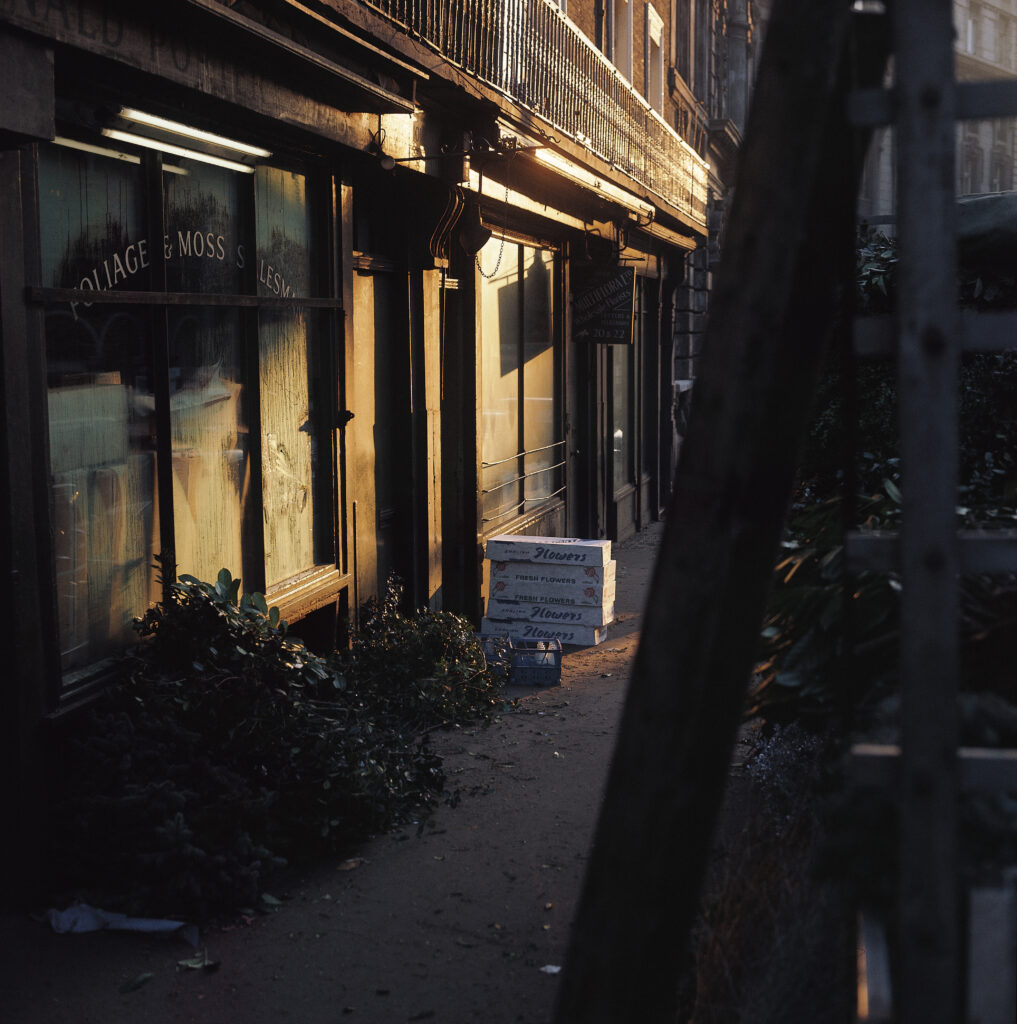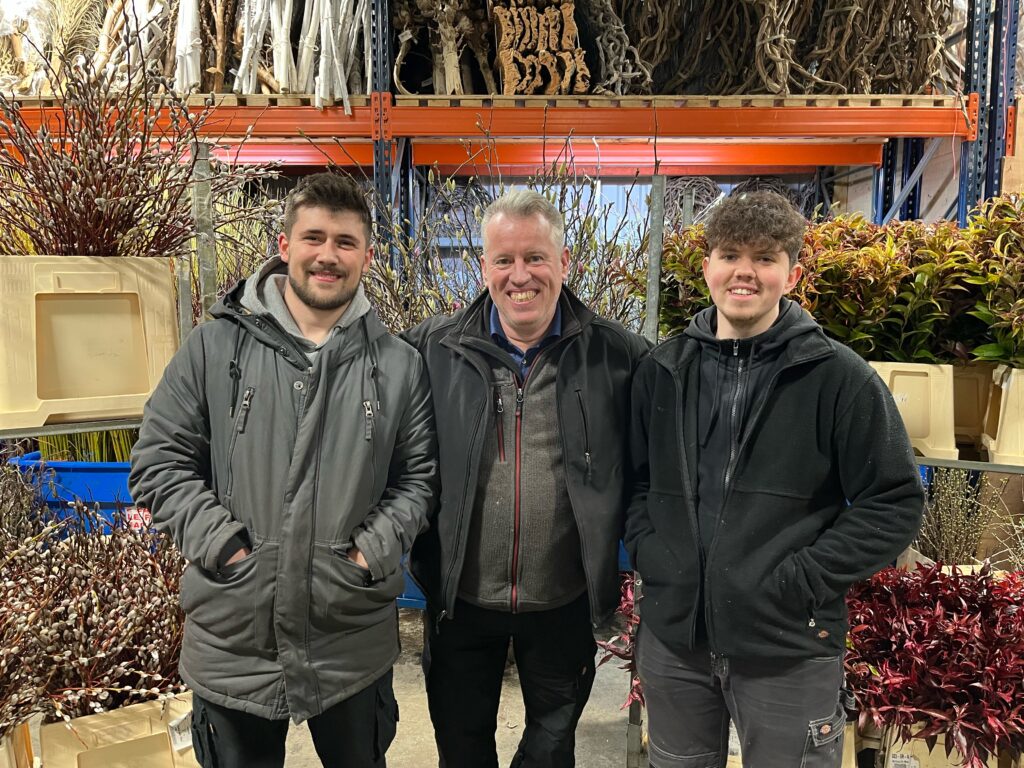Bryan Porter was part of the fourth generation to run his family’s eponymous foliage business in the Market. The Flower Market was in his blood long before he started working here in 1990. He tells Market Times the story of the company now known simply as Porters Foliage and looks at the current state of play
Let’s start where it all began – how did the Porters get into this trade?
In the early twentieth century, my great grandfather, Aaron Porter, was a feather collector, delivering into London from Sussex. One morning, he saw the activity in the old Covent Garden, went and had a look and discovered they were selling some cut foliage. He thought ‘there’s some of that near me’ and after a few conversations, began selling foliage to the traders at the market. From those beginnings, he decided to take a stand in 1910, first selling his own produce and then selling product supplied to him by other people.
The business began as Aaron Porter & Sons and at its peak, he had five shops in the market. The flower market was relatively small and they were selling from properties around Covent Garden, not in the main square, which was where the fruit and veg traders operated.

One of the Porters units at the old market
He had five sons working in the business, including my grandfather Ronald, and when Aaron died in 1948, he left a flourishing business. If I’m honest, my grandfather’s brothers were more interested in reaping the benefits of their father’s hard graft and spent all the money and lived the life! My grandfather, on the other hand, knuckled down to running the business and then went off on his own in the early ‘60s, creating Ronald Porter & Sons. Unfortunately, he died in his early 50s, in 1966, which is when my dad Brian and uncle Charlie took it on.
I’ve been in the market for 33 years now. As a child, I was always at the market and though I was very young, I do have memories of the old Covent Garden, sliding down the chutes into the cellars! Coming to this market, everything felt very space age – automatic opening doors was like being a spaceship to me at that age!
I always enjoyed being in and around the market and of course, it is in my blood, but my mum always pushed us away from the market. She gave us the best education she could because she knew what a hard life it is and the sacrifices involved. I went off and did motor vehicle engineering and worked in a dealership as a management trainee for while, but I was still living at home and one Christmas, I could see how busy my father was and went to give them a hand. That was it, once you’re in, you’re in.
Dad and Charlie ran the business until about a decade ago, before retiring and happily, they are both still with us. I loved working with him and my uncle. It was also a very good time in the economy and the market was a magical place to be – it always had a buzz and was great fun. As the industry has moved on, the market has changed and some of that fun and enjoyment has dwindled. It’s not gone altogether, but it’s harder work.
My older brother Barry had come into the business when he was 16 and I came in when I was 21 and we then ran the business for a few years and changed the name again to Porters Foliage, before he took a different direction and I bought him out.
My father encouraged me and my brother to do our own thing – he was very good at pushing us to make that effort. Big changes needed to be made to the way we sourced our product – the world had shrunk, it became easier to import and access new suppliers and I had started to travel and look for new suppliers around the world.
We found new sources in South Africa, to broaden our range of proteas and that type of produce, as well as South America and Australia. It is our diversity and ability to directly source items that aren’t likely to come through the Dutch auctions that gives us our USP. We were flying in from eight sources around the world before Covid, but it changed everything. It was devastating to the whole industry of course, but some wholesalers were affected more than others. For us it was very difficult because we didn’t have an online buying option at the time and that link into our suppliers and customers.
Our online portal opened us up to a potential new client base and raised our profile outside of the market. It’s another challenge; running an online element of your business is time consuming and has a cost attached, but the new generation coming through need the option of having things at the touch of a button and we recognise that. It is still a relatively small part of our business, but momentum is growing and we saw much bigger uptake of online sales during Christmas.
Where do you think New Covent Garden Flower Market is right now?
This market is taking stock of where we all are. The after-effects of Covid are still being felt. We got through it by borrowing money, but now we have to earn money to repay it.
Coming into the first quarter of 2023, for instance, we had had an OK Christmas ‘22 and we were looking forward to a steady year, nothing spectacular. Then, for mainly economic reasons, things just dropped off a cliff and we weren’t ready for that. The summer was steady and the last quarter was a bit better, but for my business, the last quarter is the most important period of the year by far, so if we’re quiet then, we are definitely in trouble.
Covid changed London and the way in which our industry supplies customers. Of the customer base we would have supplied pre-Covid, I’d say 10% didn’t make it through, while another 30-40% are still in business, but have removed their bricks and mortar retail element. They are working through webshops and on the telephone, but not face-to-face so much, which has a huge effect on the market.
People have placed a higher value on their time and are running their businesses with fewer staff and less resources. So, for some, coming to the market has become a question of time, simple as that. A lot of customers are buying to order, exactly what they need rather than speculating to sell onto a third party. Some are not coming to market as much as they would have, but even when they do, the purchases tend to be lower volume than they would have been prior to Covid.
The cost of transport, energy and documentation has also risen tremendously in the last three years, which has a compounding effect on the cost of the produce we sell here, so the price-point has become more expensive; undoubtedly too expensive for some.
That is our biggest challenge. We have broadened our horizons to attract customers that we may not have tapped into before. Moving forward though, we need to create more turnover, more volume, in order to sustain the market as a long-term viable proposition. I think there’s ability to expand. The key is adapting to the marketplace and the new breed of customer, which has a fresh outlook, as well as fresh ideas and expectations. They will work in a different way to traditional florists and we have to find our way to move with the evolution of the industry and work in a more flexible way.
Why does this Market remain as relevant to London’s floristry scene as ever?
Our aim is to inspire, that’s what we’re here for. Some of the most creative people in the country are our customers and when they come onto our stand, we have to inspire them to create something they weren’t going to create when they walked in.
There are secondary wholesalers around London that can offer a good service and a high percentage of what’s on offer in New Covent Garden. For some people that’s enough to get them through, but they will not get what they can get here.
I think the people who visit the market are inspired. Buying online is OK when you know what you’re buying, but the sensory side of it is still very important. We still have a unique offering – there is nowhere else where you can find the range and diversity we have at New Covent Garden Flower Market.
The key with our products is that it is very much a visual and sensory experience. You can’t smell a flower online or appreciate the texture of foliage online. You need to see it for yourself, smell it and touch it. You need to see two items side by side to know how they would physically work together, or whether you need to switch out and change for a different product. That sort of facility is still hugely important to many florists, who want to mix and match.
You now have a fifth generation of Porters in the fold, including your son, Sam...

Bryan with Sam, right, and Josh Souter
Sam is 21 and along with his cousin Aaron, who’s name of course harks back to Porter’s founding father, he is indeed the fifth generation of the family in the business.
Sam has been with the business three years now and Bryan thoroughly enjoys working with him. “Working with my son is a great experience. It’s lovely to have your family around you, to enjoy the time together and most of all it’s lovely to see them all develop as young adults, both in business and their understanding of life.
If you asked Sam if he saw himself working here, he’d say no, probably not, he came here by default and was given opportunities to do other things. But he is pretty laid back and was given the ultimatum that if he didn’t find something else, he’d have to come and work here until he did! He definitely enjoys the job, the market and the people. Does he enjoy the working hours and the routine – no, but that’s the challenge for everyone who works here. He’s still young, so we’ll see if this is his job for life or not. His life and his skills will develop and there is loads of scope for that to happen here.
Hopefully the team here will master how to run a business without me, as I won’t be here forever!
Finally Bryan, what does New Covent Garden Market mean to you?
For me, the market has always been part of my life and I want it so succeed and for everyone here to stick together. The strength of the market is made up by the combination of individual businesses, and it is that mixture that gives the market its uniqueness, its feel and its offer – as a collective we are much stronger.